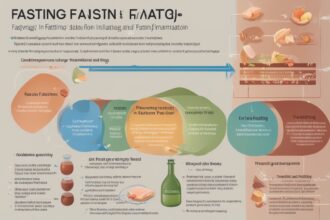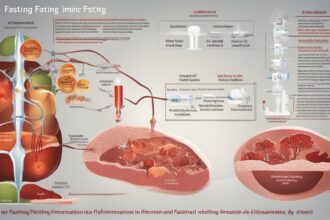Fasting, the practice of abstaining from food for specific periods, has gained significant attention in recent years for its potential health benefits. Among these benefits, one area of growing interest is its role in reducing inflammation and swelling in the body. This post explores the concept of reducing swelling through dietary abstinence, diving into the science behind fasting, its impact on inflammation, and practical ways to incorporate it into your lifestyle. Whether you’re dealing with chronic inflammation or simply seeking a natural way to support your body’s healing processes, fasting might offer a promising solution.
What Is Dietary Abstinence and How Does It Relate to Swelling?
Dietary abstinence, often referred to as fasting, involves voluntarily refraining from consuming food or certain types of food for a defined period. This practice can range from intermittent fasting (cycling between periods of eating and fasting) to prolonged fasting (abstaining for several days). Swelling, or edema, often results from inflammation, which is the body’s natural response to injury or infection. However, chronic inflammation can lead to persistent swelling and other health issues. Reducing swelling through dietary abstinence is based on the idea that fasting may lower inflammatory markers in the body, thereby alleviating swelling and related discomfort. By giving the digestive system a break, fasting allows the body to focus on repair and recovery processes that can reduce inflammation.
The Science Behind Fasting and Inflammation
Inflammation is a complex biological response involving immune cells, cytokines, and other signaling molecules. While acute inflammation is protective, chronic inflammation is linked to conditions like arthritis, heart disease, and autoimmune disorders. Research suggests that fasting can influence inflammation by altering metabolic pathways and reducing the production of pro-inflammatory cytokines. For instance, during fasting, the body shifts to using stored energy, which can trigger autophagy—a cellular cleanup process that removes damaged components and reduces inflammatory responses. Studies have shown that intermittent fasting can lower levels of C-reactive protein (CRP), a key marker of inflammation. By embracing reducing swelling through dietary abstinence, individuals may tap into these anti-inflammatory benefits naturally.
Types of Fasting for Reducing Swelling
Not all fasting methods are the same, and choosing the right approach depends on your health goals and lifestyle. Here are a few popular fasting methods that may help with reducing swelling through dietary abstinence:
- Intermittent Fasting (IF): This involves alternating periods of eating and fasting, such as the 16:8 method (16 hours of fasting, 8 hours of eating). IF is accessible for beginners and has been linked to reduced inflammation.
- Water Fasting: This is a more intense form of fasting where only water is consumed for 24–72 hours. It may promote deeper anti-inflammatory effects but should be done under supervision.
- Time-Restricted Eating (TRE): Similar to IF, TRE limits food intake to a specific window each day, helping regulate metabolic processes that influence inflammation.
Each method has its benefits, but it’s important to start gradually and consult a healthcare provider, especially if you have underlying health conditions.
Practical Tips for Fasting to Reduce Inflammation
Starting a fasting regimen for reducing swelling through dietary abstinence requires preparation and mindfulness. Here are some actionable tips to ensure a safe and effective experience:
- Stay Hydrated: Drink plenty of water during fasting periods to support detoxification and prevent dehydration, which can exacerbate inflammation.
- Break Your Fast Gently: After fasting, reintroduce food with light, anti-inflammatory options like vegetable broth or smoothies to avoid shocking your system.
- Focus on Nutrient-Dense Foods: When eating, prioritize foods rich in antioxidants, such as berries, leafy greens, and fatty fish, to complement the anti-inflammatory effects of fasting.
- Listen to Your Body: If you feel dizzy or unwell, stop fasting and seek medical advice. Fasting should not cause distress.
For more on building a balanced diet to support fasting, check out our post on Anti-Inflammatory Foods to Include in Your Diet.
Potential Risks and Considerations
While fasting shows promise for reducing swelling through dietary abstinence, it’s not without risks. Prolonged fasting or improper practices can lead to nutrient deficiencies, fatigue, or worsening of certain medical conditions like diabetes. Pregnant women, children, and individuals with eating disorders should avoid fasting unless under strict medical supervision. Additionally, fasting may not be suitable for everyone, and its effects on swelling can vary based on individual factors like age, lifestyle, and overall health. Always consult a healthcare professional before starting any fasting regimen. For more insights on safe fasting practices, read our guide on Fasting Safely: What You Need to Know.
Combining Fasting with Other Anti-Inflammatory Strategies
Fasting can be even more effective for reducing swelling through dietary abstinence when paired with other lifestyle changes. Regular physical activity, stress management techniques like meditation, and adequate sleep all contribute to lower inflammation levels. Additionally, avoiding processed foods, sugar, and trans fats during eating windows can enhance the benefits of fasting. For a deeper dive into holistic approaches, explore our article on Lifestyle Changes to Combat Chronic Inflammation. By integrating these practices, you create a comprehensive strategy to support your body’s natural healing mechanisms.
Disclaimer: The information provided in this post is for educational purposes only and is not intended as medical advice. Fasting and dietary changes can have varying effects on individuals, and results are not guaranteed. Always consult with a qualified healthcare provider before starting any fasting regimen or making significant changes to your diet, especially if you have pre-existing health conditions or are on medication. The authors and publishers of this content are not responsible for any adverse effects resulting from the application of the information provided.
References
- Fasting and Its Impact on Inflammation: A Review – NCBI
- Intermittent Fasting: Surprising Update – Harvard Health
- Fasting Diet: Can It Improve My Health? – Mayo Clinic
- Effects of Intermittent Fasting on Health and Aging – Nature
- Fasting and Metabolic Regulation – Journal of Clinical Investigation
This content is for informational purposes only and not a substitute for professional advice.






